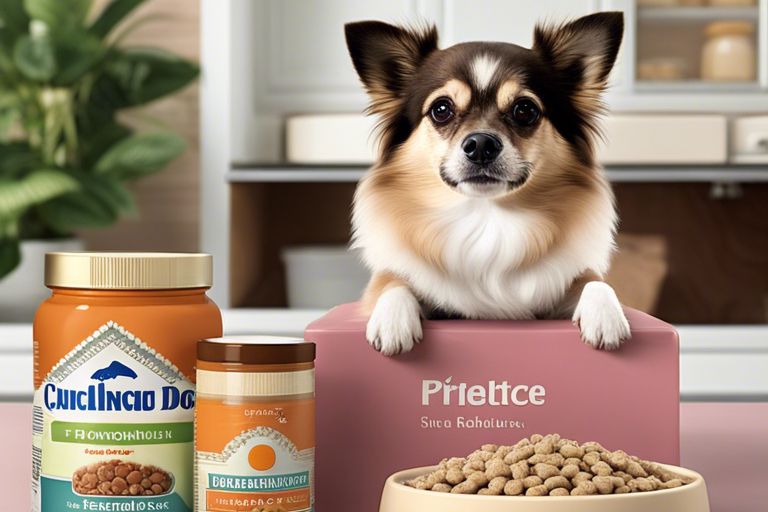As a veterinarian, I often get asked about the dietary needs of aging small dogs. It’s important to understand that as our furry friends grow older, their nutritional needs change. Small dogs are more prone to obesity and dental issues as they age, so it’s crucial to pay attention to their diet. Protein and fat content may need to be adjusted to accommodate their changing metabolism and activity levels. Additionally, supplements such as glucosamine and chondroitin can be beneficial for maintaining joint health. In this blog post, I will dive into the specific dietary requirements that small aging dogs may have and provide helpful tips for keeping them healthy and happy.
Key Takeaways:
- Caloric intake: Small dogs tend to have a high metabolic rate, so it’s important to adjust their food portions to prevent obesity as they age.
- Protein and nutrient needs: As small dogs age, their bodies may require more protein and certain nutrients to support muscle mass, joint health, and overall energy levels.
- Senior-specific diets: There are senior-specific dog foods designed to address the unique needs of aging small dogs, including those with joint support and dental health benefits.
Nutritional Needs of Aging Small Dogs
Even as small dogs age, their nutritional needs change. It’s important to understand these needs so you can provide the best care for your furry friend. In this chapter, I will cover the specific dietary requirements for aging small dogs, including caloric requirements, weight management, and essential nutrients for joint health.
Caloric Requirements and Weight Management
As your small dog ages, their metabolism slows down, making it easier for them to gain weight. It’s important to monitor their caloric intake and adjust their diet accordingly. Feeding your aging small dog a high-quality, senior-specific dog food can help maintain their weight and provide the necessary nutrients they need. Additionally, be mindful of their activity level and adjust their portion sizes to prevent obesity, which can lead to various health issues.
Essential Nutrients for Joint Health
Just like humans, small dogs can experience joint issues as they age. Providing supplements such as glucosamine and omega-3 fatty acids can help support joint health and mobility. These nutrients can be found in senior dog food formulas or administered as separate supplements recommended by your veterinarian. Ensuring your aging small dog receives the right nutrients is crucial in maintaining their overall health and quality of life.
Common Health Concerns in Small Aging Dogs
Some common health concerns in small aging dogs include obesity, dental issues, and cognitive decline. As dogs age, their nutritional needs change, and it is important to address these concerns through their diet. Optimal Nutrition for Senior Dogs Starts with Avoiding Obesity is crucial for maintaining their overall health and well-being.
Dental Issues and Diet
Dental issues are a common problem in aging dogs, and their diet plays a significant role in maintaining their oral health. Small aging dogs are more prone to dental problems such as tartar buildup, gum disease, and tooth loss. Feeding them a diet rich in chewing and crunchy food can help prevent plaque and tartar from accumulating on their teeth. Additionally, providing your dog with dental chews or toys can help promote oral hygiene and keep their teeth clean.
Cognitive Function and Dietary Factors
Cognitive decline is another concern in small aging dogs, with conditions such as Canine Cognitive Dysfunction (CCD). My senior dog with signs of CCD, and I noticed a significant improvement in his cognitive function after I switched him to a diet rich in antioxidants and omega-3 fatty acids. Including brain-boosting supplements and providing puzzle toys for mental stimulation can also support your dog’s cognitive health. Though cognitive decline is a natural part of aging, these dietary factors can help slow down the process and improve your dog’s overall quality of life.
- Antioxidants – such as vitamins C and E, and beta-carotene, can help protect your dog’s brain from oxidative stress and aid in cognitive function.
- Omega-3 fatty acids – found in fish oil, can help reduce inflammation in the brain and support cognitive function in aging dogs.
- Brain-boosting supplements – such as MCT oil or Sam-e, can help support cognitive health and improve brain function in senior dogs.
- Puzzle toys – provide mental stimulation and can help slow down cognitive decline in aging dogs.
I strongly recommend incorporating these dietary factors into your senior dog’s diet to support their cognitive function as they age.

Creating an Optimal Diet Plan
Keep in mind that the dietary requirements of small dogs can vary based on factors such as breed, size, and overall health. When creating a diet plan for your aging small dog, it’s important to consider their individual needs. As dogs age, their metabolism may slow down, and they may become less active, so it’s essential to tailor their diet accordingly. A well-balanced diet can help maintain their overall health, provide them with the necessary nutrients, and support their aging bodies.
Commercial Diets vs. Homemade Meals
When it comes to choosing the right diet for your senior small dog, you have the option of feeding them commercial diets or preparing homemade meals. Commercial diets are convenient and are formulated to meet the dietary needs of aging dogs. Look for high-quality brands that offer formulas specifically designed for small breed seniors. On the other hand, homemade meals give you complete control over the ingredients you feed your dog. You can customize the meals to suit your dog’s preferences and dietary restrictions. However, it’s crucial to ensure that the homemade meals are nutritionally balanced and meet your dog’s specific needs. Whichever option you choose, be sure to consult with a veterinarian or a canine nutritionist to ensure that your dog’s diet is adequate and nutritionally balanced.
Supplements and Special Dietary Additions
As small dogs age, they may require additional supplements or special dietary additions to support their overall health. Omega-3 fatty acids, glucosamine, and chondroitin are commonly added to senior dog diets to support joint health and mobility. These supplements can be beneficial for small dogs who are prone to joint issues such as hip dysplasia. Additionally, consider incorporating antioxidants and vitamins such as vitamin E and C to support your aging dog’s immune system. However, it’s crucial to consult with a veterinarian before adding any supplements to your dog’s diet, as excessive amounts of certain supplements can have adverse effects on your dog’s health. Always consider your dog’s individual health needs when adding supplements or special dietary additions to their diet.
Practical Feeding Tips for Small Aging Dogs
Your small aging dog may have specific dietary requirements that need to be addressed in order to keep them healthy and active. Here are some practical feeding tips to ensure that your furry friend gets the nutrition they need as they age:
- Choose a high-quality, balanced diet specifically formulated for small breed senior dogs.
- Feed smaller, more frequent meals to help prevent digestive issues and keep their energy levels up.
- Consider adding supplements such as glucosamine and omega-3 fatty acids to support joint health and cognitive function.
- Monitor their weight and adjust portion sizes accordingly to prevent obesity and reduce strain on their joints.
- Provide fresh, clean water at all times to keep them hydrated and aid in digestion.
The key is to provide a diet that is tailored to your small aging dog’s specific needs, taking into account their size, age, and any health issues they may have.
Feeding Schedules and Portion Control
It’s important to establish a regular feeding schedule for your small aging dog to help maintain their digestive health and prevent unnecessary weight gain. I recommend feeding them two to three small meals a day at consistent times. Portion control is also crucial, as excess weight can lead to a variety of health problems in small aging dogs. Be mindful of the portion sizes recommended on the dog food packaging, and adjust as necessary based on your dog’s activity level and body condition.
Monitoring Health and Diet Adjustments
As your small dog ages, it’s essential to keep a close eye on their health and make any necessary adjustments to their diet. I recommend regular vet check-ups to monitor their weight, joint health, and overall well-being. If your dog develops any health issues such as diabetes or kidney disease, their dietary needs will likely change, and adjustments may need to be made to their food and supplement intake. I also advise regularly checking for signs of dental problems, as these can affect their ability to eat and may require dietary modifications.
FAQ
Q: Are there specific dietary requirements for small dogs as they age?
A: Yes, small dogs have specific dietary needs as they age. Their metabolism slows down and they may become less active, so it’s important to adjust their diet to reflect these changes.
Q: What changes should be made to the diet of small aging dogs?
A: As small dogs age, they may require a lower calorie diet to prevent weight gain. It’s important to choose a high-quality senior dog food that is specifically formulated for small breeds, as they may have different nutritional needs compared to larger breeds.
Q: Are there any specific nutrients that small aging dogs need in their diet?
A: Small aging dogs may benefit from added glucosamine and chondroitin to support joint health, as well as increased levels of antioxidants to support their aging immune system. Additionally, it’s important to monitor their protein and fat intake to maintain muscle mass and energy levels.

